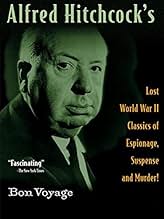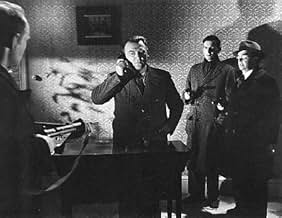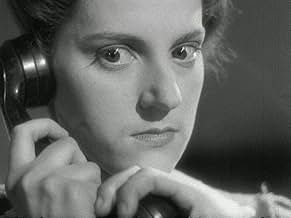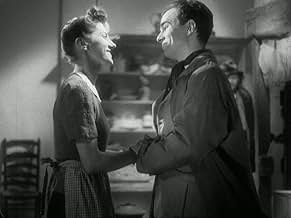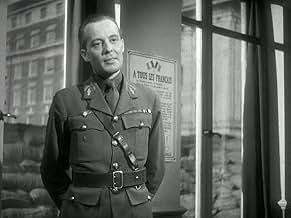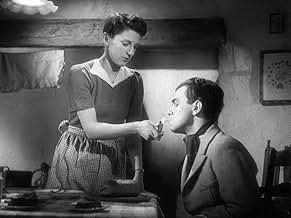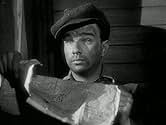AVALIAÇÃO DA IMDb
6,1/10
2,1 mil
SUA AVALIAÇÃO
Adicionar um enredo no seu idiomaA young Scottish R. A. F. Gunner is debriefed by French officials about his escape from occupied territory, and in particular one person who may or may not have been a German Agent.A young Scottish R. A. F. Gunner is debriefed by French officials about his escape from occupied territory, and in particular one person who may or may not have been a German Agent.A young Scottish R. A. F. Gunner is debriefed by French officials about his escape from occupied territory, and in particular one person who may or may not have been a German Agent.
- Direção
- Roteiristas
- Artistas
- Direção
- Roteiristas
- Elenco e equipe completos
- Produção, bilheteria e muito mais no IMDbPro
Avaliações em destaque
Shot in 1944 entirely in French (version seen has English subtitles), in style rather like a short section of a budget version of his "Lady Vanishes", it must have been intended for clandestine distribution in occupied and Vichy France. For this reason and the fact that it appears to have a clear practical purpose it presumably is a training film. It is thus not primarily a tribute to the French Resistance, its purpose seems instead to be to warn them of a dangerous new Gestapo method of infiltration. Hitchcock's contribution was to make the message clear and hold the attention.
It concerns the return to England of a British air-gunner (played by English actor John Blythe in French) recently escaped from a German prisoner of war camp. He has safely arrived back in London due to the help he received from the French Resistance and is being de-briefed by French exile officers. What should though have been a happy conclusion to a successful escape is soured when the true tragic facts are revealed to him that he has been an innocent pawn in a dastardly Gestapo design for the infiltration of the French resistance network. In this he was made a carrier of something deadly - not disease but something similarly poisonous - that he had been made to unwittingly expose members of the Resistance. One guesses that the main purpose of the film was to warn everyone of this.
It concerns the return to England of a British air-gunner (played by English actor John Blythe in French) recently escaped from a German prisoner of war camp. He has safely arrived back in London due to the help he received from the French Resistance and is being de-briefed by French exile officers. What should though have been a happy conclusion to a successful escape is soured when the true tragic facts are revealed to him that he has been an innocent pawn in a dastardly Gestapo design for the infiltration of the French resistance network. In this he was made a carrier of something deadly - not disease but something similarly poisonous - that he had been made to unwittingly expose members of the Resistance. One guesses that the main purpose of the film was to warn everyone of this.
I have read a couple of message board comments on this film slating another reviewer (who didn't like it) for not understanding its "role" so for fear of upsetting those unable to cope with different opinions let me just say what I understand to be the case. Bon Voyage was one of two short films made by Hitchcock to encourage and bolster the French resistance by putting them at the core of the films and making them in French. It was an important gesture from the famous director and I'm sure was appreciated by those risking their lives in occupied France. However if all I am allow to comment on is its "role" then I should stop the review there.
Fortunately for me, the sight of a "0 of 10 users found this review useful" slogan doesn't bother me at all, so I will do what I normally do and just state my opinion and move on. Other than the war-effort significance, there is not much to this film to recommend it for now. The plot is set up in a terribly stiff device of flashbacks which puts a lot of pressure of the narration another device that doesn't totally work. The story itself has a few twists but the delivery does suck the life out of them and, contrary to what others might say, there isn't much in the way of classic Hitchcock to be had here. The end result is a plodding and simplistic tale that is dull and straightforward.
So by all means, let's hold up Bon Voyage as a worthy effort on the part of Hitchcock and give it its dues in regards supporting the resistance but please let's not pretend that it is a good film worth seeking out because it most certainly is not.
Fortunately for me, the sight of a "0 of 10 users found this review useful" slogan doesn't bother me at all, so I will do what I normally do and just state my opinion and move on. Other than the war-effort significance, there is not much to this film to recommend it for now. The plot is set up in a terribly stiff device of flashbacks which puts a lot of pressure of the narration another device that doesn't totally work. The story itself has a few twists but the delivery does suck the life out of them and, contrary to what others might say, there isn't much in the way of classic Hitchcock to be had here. The end result is a plodding and simplistic tale that is dull and straightforward.
So by all means, let's hold up Bon Voyage as a worthy effort on the part of Hitchcock and give it its dues in regards supporting the resistance but please let's not pretend that it is a good film worth seeking out because it most certainly is not.
"Bon Voyage" was one of two short French language propaganda films made by Alfred Hitchcock for the British Ministry of Information in 1944, the other being "Aventure Malgache". The film depicts the escape of a downed Royal Air Force air gunner through German-occupied France, with the assistance of Resistance fighters. The purpose was presumably to inform French exiles in Britain and America, and those living in territory controlled by the Free French Government, of the work being done, and the sacrifices being made, by their compatriots in the Resistance.
The film is very short, at only 26 minutes long, and today is likely to be principally of interest to Hitchcock completists. It does, however, have its points of interest, notably its use of multiple viewpoints of the same events, a technique that looks forward to later films such as Kurosawa's "Rashomon". We see the airman being debriefed by a Free French intelligence officer in London and quickly realise that the intelligence officer knows things about the escape that the young man himself is unaware of, especially that he has been an unwitting pawn in a German scheme for getting information to one of their agents in Britain. Another theme of the film is a warning to the French to be on their guard against the dirty tricks of the Germans and their Vichy French collaborators.
"Bon Voyage" was presumably intended principally as a propaganda film rather than as dramatic entertainment; had it been intended as the latter, it would have needed to have been at least three times as long. This is the reason why I have not awarded it a mark out of ten.
The film is very short, at only 26 minutes long, and today is likely to be principally of interest to Hitchcock completists. It does, however, have its points of interest, notably its use of multiple viewpoints of the same events, a technique that looks forward to later films such as Kurosawa's "Rashomon". We see the airman being debriefed by a Free French intelligence officer in London and quickly realise that the intelligence officer knows things about the escape that the young man himself is unaware of, especially that he has been an unwitting pawn in a German scheme for getting information to one of their agents in Britain. Another theme of the film is a warning to the French to be on their guard against the dirty tricks of the Germans and their Vichy French collaborators.
"Bon Voyage" was presumably intended principally as a propaganda film rather than as dramatic entertainment; had it been intended as the latter, it would have needed to have been at least three times as long. This is the reason why I have not awarded it a mark out of ten.
"Bon Voyage" is a short, French-language film, one of two such features that Alfred Hitchcock made during World War II as a tribute to the French Resistance. It will be of special interest to fans of the great director, but it is also an interesting, exciting story that is worthwhile in its own right.
As the story opens, we meet a young Scottish pilot from the RAF who has successfully escaped German-occupied territory with help from the resistance. He is being de-briefed about his experiences by intelligence officials, and he goes back and relates for them (and for the audience) his exciting story. Then, in the second half, the officials take him back through the same events, to reveal some astounding surprises.
It is all nicely done in fine Hitchcock fashion. It is very much like a good episode from "Alfred Hitchcock Presents", and is about the same length.
Hitchcock fans should not miss "Bon Voyage", as there is nothing else quite like it in his movie credits. It is also a good story that should be of at least some interest to anyone interested in World War II films or spy dramas.
As the story opens, we meet a young Scottish pilot from the RAF who has successfully escaped German-occupied territory with help from the resistance. He is being de-briefed about his experiences by intelligence officials, and he goes back and relates for them (and for the audience) his exciting story. Then, in the second half, the officials take him back through the same events, to reveal some astounding surprises.
It is all nicely done in fine Hitchcock fashion. It is very much like a good episode from "Alfred Hitchcock Presents", and is about the same length.
Hitchcock fans should not miss "Bon Voyage", as there is nothing else quite like it in his movie credits. It is also a good story that should be of at least some interest to anyone interested in World War II films or spy dramas.
"Bon Voyage" is a very short propaganda film about the French resistance which Hitchcock did for the war effort in 1944. It was met with disappointment and later shelved.
The only person billed is John Blythe; the rest are called "The Moliere Players" to protect them from the Nazis.
Blythe plays a Scottish RAF Sgt. John Dougall. He is being debriefed about his escape from France by French intelligence officers in London.
Dougall has escaped from a prisoner of war camp along with Stefan Godowski, who actually put the plan together. The two stick together until there is a Resistance-aided pick-up in France by plane. But only one can go, so they shoot dice for it. Dougall is the one to leave.
Upon meeting with the Intelligence agents, Dougall says that he hopes Godowski made it and wants to know what happened. As it turns out, although the agents wanted Dougall's story about how he was helped along the way, they already knew it.
Good story, but it was too low-key for what the government wanted from Hitchcock - a real rah-rah story and big ending concerning the Resistance.Instead, it showed ordinary people taking risks, which I found moving and effective.
An old woman I knew was in Vienna studying just before the war broke out and, for academic reasons, went looking for Heinrich Mann, who was hiding out in France. (And I just saw a film about this very thing, Varian's War). On the beach, she saw a man and woman playing ball on the beach, and the ball kept landing near her. They turned out to be members of the Resistance.
I believe she did find Mann in a bar somewhere, but what impressed her (and me) is that this couple told her that they would never quit their work until Nazism was defeated.
In the end, I think Hitchcock told the right story. It's not the big triumph but the work that people do leading up to it, sometimes small things, that win a war.
The only person billed is John Blythe; the rest are called "The Moliere Players" to protect them from the Nazis.
Blythe plays a Scottish RAF Sgt. John Dougall. He is being debriefed about his escape from France by French intelligence officers in London.
Dougall has escaped from a prisoner of war camp along with Stefan Godowski, who actually put the plan together. The two stick together until there is a Resistance-aided pick-up in France by plane. But only one can go, so they shoot dice for it. Dougall is the one to leave.
Upon meeting with the Intelligence agents, Dougall says that he hopes Godowski made it and wants to know what happened. As it turns out, although the agents wanted Dougall's story about how he was helped along the way, they already knew it.
Good story, but it was too low-key for what the government wanted from Hitchcock - a real rah-rah story and big ending concerning the Resistance.Instead, it showed ordinary people taking risks, which I found moving and effective.
An old woman I knew was in Vienna studying just before the war broke out and, for academic reasons, went looking for Heinrich Mann, who was hiding out in France. (And I just saw a film about this very thing, Varian's War). On the beach, she saw a man and woman playing ball on the beach, and the ball kept landing near her. They turned out to be members of the Resistance.
I believe she did find Mann in a bar somewhere, but what impressed her (and me) is that this couple told her that they would never quit their work until Nazism was defeated.
In the end, I think Hitchcock told the right story. It's not the big triumph but the work that people do leading up to it, sometimes small things, that win a war.
Você sabia?
- CuriosidadesApart from John Blythe, all of the other actors in this short movie were French, and were simply credited as "The Molière Players" in order to protect their families from the Nazis.
- Citações
Free French Colonel: [Last words] It's a dreadful business. Perhaps there'll be another tomb one day under the Arc de Triomphe: The Unknown Civilian.
- Versões alternativasThere is an Italian edition of this film on DVD, distributed by DNA Srl: "LIFEBOAT (1944) + BON VOYAGE (1944)" (2 Films on a single DVD), re-edited with the contribution of film historian Riccardo Cusin. This version is also available for streaming on some platforms.
- ConexõesFeatured in WatchMojo: Top 10 War Propaganda Films (2014)
Principais escolhas
Faça login para avaliar e ver a lista de recomendações personalizadas
Detalhes
- Data de lançamento
- País de origem
- Idiomas
- Também conhecido como
- Щасливої дороги
- Locações de filme
- Empresas de produção
- Consulte mais créditos da empresa na IMDbPro
- Tempo de duração26 minutos
- Cor
- Proporção
- 1.37 : 1
Contribua para esta página
Sugerir uma alteração ou adicionar conteúdo ausente

Principal brecha
By what name was Bon Voyage (1944) officially released in Canada in English?
Responda
